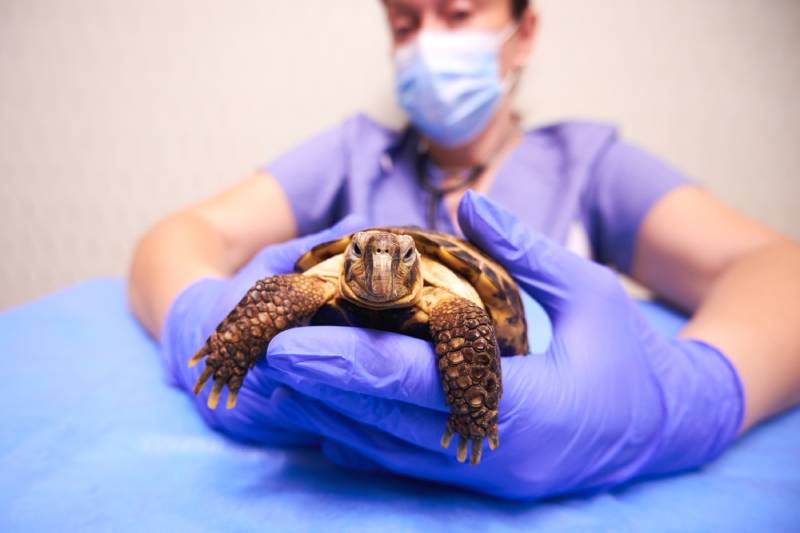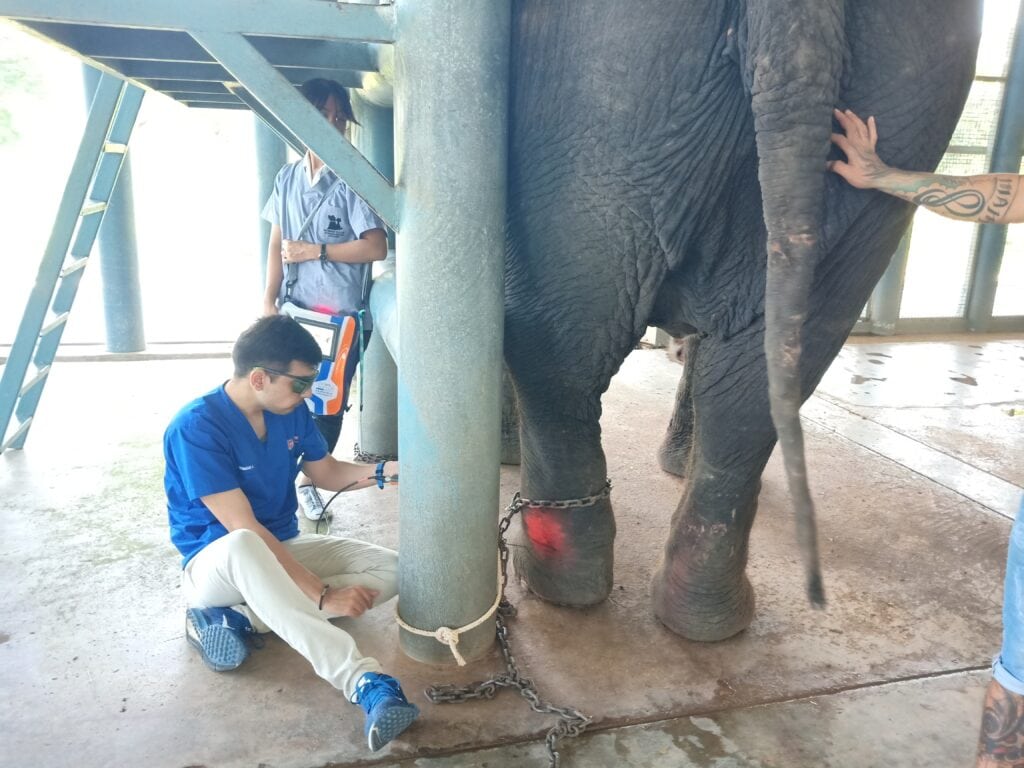Exotic Animal Veterinarians: What Are They & How to Become One
By Ashley Bates
Updated on

Click to Skip Ahead
If you’re a person who absolutely loves animals, you’re looking into all fields of work. Whether you’re unhappy in your current career or fresh out of school looking to explore options, you’ve probably heard of an exotic veterinarian during your search.
The truth is, a lot more goes into being an exotic veterinarian, as opposed to a traditional practice. Here, we’re going to look at all of the aspects of being an exotic veterinarian so you can see if it sounds like a right fit for you.
The 5 Steps to Become an Exotic Animal Veterinarian
Traditional veterinary practices primarily focus on domesticated animals such as dogs and cats. When you’re an exotic animal veterinarian, you get to work with all different types of wildlife. Often, this extends to smaller cage animals as well. Exotic vets work with reptiles, birds, and larger mammals that you don’t traditionally see inside of standard veterinary settings.
There are a few steps to becoming an officially licensed exotic vet. Here they are in detail!
- Animal Science
- Anatomy
- Biology
- Chemistry
- Zoology

2. You must be accepted into an accredited veterinary school.
Once you achieve your bachelor’s, it’s time to get into veterinary medicine. This takes an average of 5-6 years to complete.
During this stage of schooling, you’ll learn about:
- Pre-clinical subjects: animal anatomy and physiology, nutrition, biology, production animal care and management
- Para-clinical subjects: radiology, pathology, parasitology, virology, bacteriology, pharmacology, and other subjects necessary for understanding a diagnostic approach
- Clinical subjects: species-specific medicine courses, hands-on training with patients and clients, public health, surgery, anesthesiology, preventive medicine, clinical conferences, and other subjects which begin incorporating everything you learn to understand patient management and care alongside client education.
In addition to these subjects, you will also participate in extensive training (under the supervision of a vet) towards the end of your degree program. These practical courses are a requirement for graduation to ensure you are able to properly handle real-worlds cenarios, and practice proper restraint when dealing with animals of varying temperament. These courses also help you develop and hone clinical skills, such as understanding how to administer medication, injections, manage anesthetic patients, care for Intensive Care Unit (ICU) animals, perform emergency resuscitation, and so on.
3. You must obtain proper licensing post-graduation.
After graduating from your vet program, you must obtain the appropriate licensing. This can vary depending on where you live, so knowing the requirements for your particular location is important. Often, you’re required to pass state exams and veterinary licensing exams.
4. Gain experience in real-world settings.
After you graduate, it’s time to get your hands dirty. You will likely have lots of hands-on training during schooling, but this is a time for volunteering, externships, internships, and other types of training.
Some veterinary schools allow students in their final year to choose a specific species or branch of medicine and spend more time with those animals. However, this may not apply to all vet schools. Therefore, this is the time you can focus in areas and animals you prefer to work with, such as avian, reptile, big cats, and other specialized zoos, sanctuaries, or facilities.
5. Acquire appropriate specializations.
If you need to, you might have to obtain additional training in specialized studies. Meaning that if you are interested in a specific area of study or type of animal, you might have to obtain extra credentials to achieve your career goals.
Ultimately, the road to becoming a licensed exotic veterinarian is long, and the specifics depend significantly on what animal category interests you most.
What Are the Different Types of Exotic Animal Veterinarians?
As an exotic animal veterinarian, you can work with all kinds of animals, if you have proper schooling. However, since it is such a specialized field of medicine, you can really hone in on one area.
- Reptile and amphibian
- Avian
- Aquatic
- Exotic animal companion
- Equine
- Laboratory
- Large mammals
- Small mammals
Exotic vets can specialize in:
- Cardiology
- Small animal internal medicine
- Large animal internal medicine
- Dentistry
- Anesthesiology
- Internal Medicine
- Oncology
- Nutrition
- Neurology
- Pathology
- Epidemiology
- Surgery
Although, the field of veterinary medicine is vast and not limited to this list.

Where Is It Used?
You can find exotic veterinarians and plenty of different places.
- Zoos
- Private practices
- Veterinary hospitals
- Sanctuaries
- Wildlife rescue/rehab centers
Necessary Tasks of the Job
You need more than just a love for animals to be an exotic veterinarian. While that is the most crucial part, it takes a certain personality and skill set to be successful.
- Monitoring animals for changes in behavior
- Performing basic examinations
- Diagnosing illness and disease in sick animals
- Controlling disease outbreaks in multi-animal settings
- Educating people on exotic animals
- Potentially guiding captive breeding programs
- Researching vaccinations and medicines
- Administering vaccines and medicines
- Treating flesh wounds and physical injuries
- Performing surgeries
- Addressing health of animals under your care
- Adhering to safety procedures
- Administering sedation for transport or treatment
- Organizing feeding schedules
- Focusing on proper nutrition for exotics in captivity

The 7 Soft Skills for Exotic Veterinarians
1. Problem-Solving
As an exotic veterinarian, you must be able to quickly and efficiently solve problems as they come to you. Medical settings are always unpredictable, and you have to be willing to meet the challenges as they arise.
2. Communication
You have to have excellent communication skills both with your team members and outside medical professionals. As an exotic vet, you will also give instructions to animal caretakers, which must be clear and efficiently carried out. Their very life could be on the line for certain animals and trying times.
3. Interpersonal Skills
Teamwork is so important in the veterinary field. Many exotic animals are unpredictable and can be large or dangerous. Having excellent interpersonal skills with your teammates is crucial for a well-oiled machine.
4. Customer Service
Yes, you read that right. Even exotic animal veterinarians have to have excellent customer service skills. This is especially true if you work in your own practice with owners with exotic pets in their care.

5. Adaptability
Things can change very quickly in this line of work. You have to be ready to jump immediately. You will be dealing with new or unknown diseases, injuries, transfers, and tons of other things that you might not be expecting. You must be able to cope quickly with a clear mind.
6. Compassion
Naturally, you need compassion toward the animals you’re working with. This is not an environment where you can have a cold or a nonchalant attitude toward your patients. It would help if you had a genuine passion and understanding of animal sensitivity.
7. Working Well Under Stress
One of the most important things you should master is working well under pressure. This very stressful job can demand a lot out of you. Many things will happen beyond your realm of control, and you have to work quickly, as sometimes the very life of an animal could be on the line.
The 7 Hard Skills for Exotic Animal Veterinarians
1. Medical Records Keeping
As an exotic animal veterinarian, you must keep a close record of changes in an animal’s life. All changes from birth until the present must be properly documented in a record system. Most records are now kept electronically, but sometimes filing is important for the role, as some documents are printed or handwritten.

2. Properly Filling Up a Prescription
As an exotic animal veterinarian, you will need to properly fill out prescriptions for any medications to prescribe for your patients.
3. Preventative Care
The best way to combat illness and disease is not to let it happen. As an exotic animal veterinarian, you must work diligently to ensure that illness doesn’t spread rampantly throughout the facility and that all pest control measures are implemented.
4. Diagnostic Testing
Diagnostic testing is something you will likely use every day in your practice. Diagnostic testing is a very common care method in the exotic animal field. You have to use urine and blood samples, X-rays, and other testing to diagnose certain ailments.
5. Internal Medicine
Internal medicine is exactly what it sounds like. You will be dealing with treating the internal organs of an exotic animal. Therefore, you will have to be able to identify and effectively handle any internal diseases that might crop up.
6. Analytical Skills
You must review all records and information about every animal in your care to ensure you are giving them the appropriate treatment. You have to interpret, gather, and analyze the data in your possession to monitor and identify any problem efficiently.

7. Management Skills
Most exotic animal veterinarians are essentially business owners. Teamwork is a crucial element to this, so having a good rapport with your employees is of utmost importance. Even if you work for a practice, your position automatically gives you authority. Often, you will have a trained staff underneath the view to which you will delegate certain duties.
The 4 Advantages of Being an Exotic Animal Veterinarian
You’ve probably already thought about the tons of advantages that would come with being an exotic animal veterinarian. Primarily, you get to work with any animal of your choice outside of the domestic, traditional pets we see everyday.
1. You Have Opportunities to Travel
If you’re an exotic vet, you can really explore. This field gives you lots of travel opportunities if you choose to do so. Many vets stay in a fixed business, particularly if you own your own practice. However, if you don’t you can find places across the globe to work, which broadens your horizons.
2. Work Is Usually Never Mundane or Boring
If you’re a person who thrives on adventure, you might absolutely love this field. You will encounter new things every day, even if you work at the same place, which presents many challenges and benefits. You can also involve yourself in conservation efforts and individual animal husbandry or welfare.

3. You Are Able to Work with Remarkable Species of Animals
If you are truly a person who is passionate about animals, this is going to be the thing that draws you in and excites you most. As an exotic vet, you will encounter animals daily that you would never see in the real world. Every experience will leave you in awe.
4. You Have a Wide Range of Expertise Options
As an exotic animal vet, you can work with something as small as a rat, or as large as an elephant—and everything in between. So, your options for work are vast. You can also study one specific field of medicine, only to change it later with appropriate schooling and certifications. There’s room for exponential growth, which many find attractive about the career.
The 2 Disadvantages of Being an Exotic Animal Veterinarian
As with any dream, it comes with its share of downfalls. Here are some aspects to consider before committing to schooling.
1. Schooling Is Lengthy and Difficult
It takes a long time to go through all of the schooling necessary to be a veterinarian. Exotic vets take even more time, requiring a high degree of specialization. Exotic vets cover a specific variety of animals, and you must have a lot of drive to accomplish the result.
2. You Must Learn a Lot About Legalities
As an exotic animal veterinarian, you must learn each area’s laws about which animals are allowed to be in private possession. Many exotic animals will need to be in facilities or sanctuaries. However, if you work with private owners, you need to make sure that they have all the licensing required.

Frequently Asked Questions (FAQs)
How long do you have to go to school to be an exotic animal veterinarian?
Exotic veterinarians have to go to school for a minimum of 7 years and even more for specializations. Training includes internships and other programs that give you hands-on experience to learn in real-world settings.
Do all exotic vets have the same opportunities?
As an exotic animal, you have many opportunities in the field. But all of these will be dependent on the type of schooling you choose and the specializations you hone in on. Every exotic vet will be different in that regard. This opens the door to a lot of exciting possibilities.
Do all exotic animal veterinarians require the same schooling?
While there are several requirements for any person to be an exotic animal veterinarian, it does change based on a few factors. First of all, the area you live in dramatically dictates licensing requirements. Also, several different degrees can eventually lead you into veterinary medicine. This is definitely not a one-size-fits-all field.

Conclusion
Becoming an exotic animal veterinarian is an extremely exciting career choice. It takes dedication, devotion, passion, patience, and certain personality characteristics. While this field is great for animal lovers, it could also be emotionally taxing and stressful on a normal day.
You have to understand the challenges and benefits of this type of work. If you are a great fit, the possibilities through schooling are endless, and you have the whole world in your hands. Best of luck creating a career working with animals! The world certainly needs more compassionate hearts to do the work for the voiceless.
Featured Image Credit: galitsin, Shutterstock













